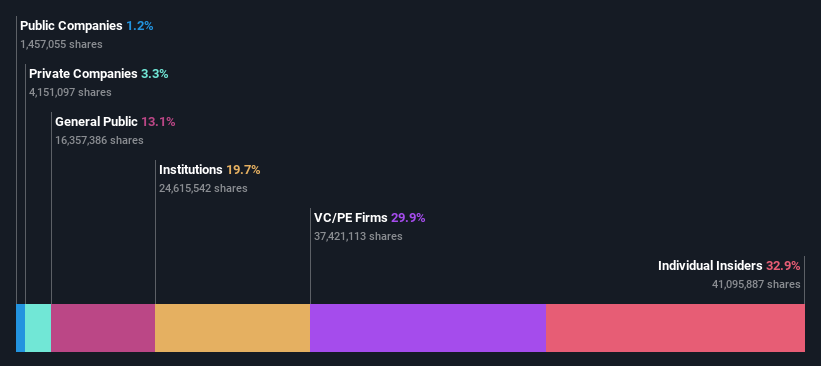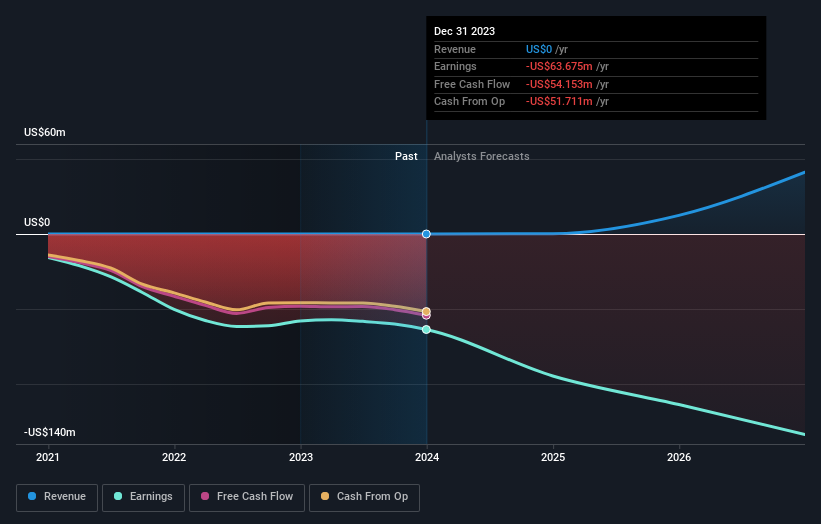- United States
- /
- Life Sciences
- /
- NasdaqGS:NAUT
Insiders of Nautilus Biotechnology, Inc. (NASDAQ:NAUT) must be frustrated after market cap dropped US$38m since recent purchases

Key Insights
- Nautilus Biotechnology's significant insider ownership suggests inherent interests in company's expansion
- The top 4 shareholders own 54% of the company
- Insiders have been buying lately
If you want to know who really controls Nautilus Biotechnology, Inc. (NASDAQ:NAUT), then you'll have to look at the makeup of its share registry. And the group that holds the biggest piece of the pie are individual insiders with 33% ownership. In other words, the group stands to gain the most (or lose the most) from their investment into the company.
It's interesting to note that insiders have been buying shares recently. So the news of stock price falling by 10.0% is not something they might have been expecting soon after purchasing shares.
In the chart below, we zoom in on the different ownership groups of Nautilus Biotechnology.
Check out our latest analysis for Nautilus Biotechnology

What Does The Institutional Ownership Tell Us About Nautilus Biotechnology?
Many institutions measure their performance against an index that approximates the local market. So they usually pay more attention to companies that are included in major indices.
As you can see, institutional investors have a fair amount of stake in Nautilus Biotechnology. This can indicate that the company has a certain degree of credibility in the investment community. However, it is best to be wary of relying on the supposed validation that comes with institutional investors. They too, get it wrong sometimes. It is not uncommon to see a big share price drop if two large institutional investors try to sell out of a stock at the same time. So it is worth checking the past earnings trajectory of Nautilus Biotechnology, (below). Of course, keep in mind that there are other factors to consider, too.

We note that hedge funds don't have a meaningful investment in Nautilus Biotechnology. From our data, we infer that the largest shareholder is Parag Mallick (who also holds the title of Top Key Executive) with 17% of shares outstanding. Its usually considered a good sign when insiders own a significant number of shares in the company, and in this case, we're glad to see a company insider play the role of a key stakeholder. Meanwhile, the second and third largest shareholders, hold 14% and 14%, of the shares outstanding, respectively. Interestingly, the third-largest shareholder, Sujal Patel is also a Member of the Board of Directors, again, indicating strong insider ownership amongst the company's top shareholders.
To make our study more interesting, we found that the top 4 shareholders control more than half of the company which implies that this group has considerable sway over the company's decision-making.
While studying institutional ownership for a company can add value to your research, it is also a good practice to research analyst recommendations to get a deeper understand of a stock's expected performance. Quite a few analysts cover the stock, so you could look into forecast growth quite easily.
Insider Ownership Of Nautilus Biotechnology
The definition of an insider can differ slightly between different countries, but members of the board of directors always count. The company management answer to the board and the latter should represent the interests of shareholders. Notably, sometimes top-level managers are on the board themselves.
Most consider insider ownership a positive because it can indicate the board is well aligned with other shareholders. However, on some occasions too much power is concentrated within this group.
Our information suggests that insiders maintain a significant holding in Nautilus Biotechnology, Inc.. Insiders own US$110m worth of shares in the US$334m company. This may suggest that the founders still own a lot of shares. You can click here to see if they have been buying or selling.
General Public Ownership
The general public, who are usually individual investors, hold a 13% stake in Nautilus Biotechnology. While this group can't necessarily call the shots, it can certainly have a real influence on how the company is run.
Private Equity Ownership
With a stake of 30%, private equity firms could influence the Nautilus Biotechnology board. Some might like this, because private equity are sometimes activists who hold management accountable. But other times, private equity is selling out, having taking the company public.
Private Company Ownership
We can see that Private Companies own 3.3%, of the shares on issue. It might be worth looking deeper into this. If related parties, such as insiders, have an interest in one of these private companies, that should be disclosed in the annual report. Private companies may also have a strategic interest in the company.
Next Steps:
I find it very interesting to look at who exactly owns a company. But to truly gain insight, we need to consider other information, too. Case in point: We've spotted 3 warning signs for Nautilus Biotechnology you should be aware of, and 2 of them are concerning.
Ultimately the future is most important. You can access this free report on analyst forecasts for the company.
NB: Figures in this article are calculated using data from the last twelve months, which refer to the 12-month period ending on the last date of the month the financial statement is dated. This may not be consistent with full year annual report figures.
Valuation is complex, but we're here to simplify it.
Discover if Nautilus Biotechnology might be undervalued or overvalued with our detailed analysis, featuring fair value estimates, potential risks, dividends, insider trades, and its financial condition.
Access Free AnalysisHave feedback on this article? Concerned about the content? Get in touch with us directly. Alternatively, email editorial-team (at) simplywallst.com.
This article by Simply Wall St is general in nature. We provide commentary based on historical data and analyst forecasts only using an unbiased methodology and our articles are not intended to be financial advice. It does not constitute a recommendation to buy or sell any stock, and does not take account of your objectives, or your financial situation. We aim to bring you long-term focused analysis driven by fundamental data. Note that our analysis may not factor in the latest price-sensitive company announcements or qualitative material. Simply Wall St has no position in any stocks mentioned.
About NasdaqGS:NAUT
Nautilus Biotechnology
A development stage life sciences company, engages in creating a platform technology for quantifying and unlocking the complexity of the proteome.
Flawless balance sheet low.

